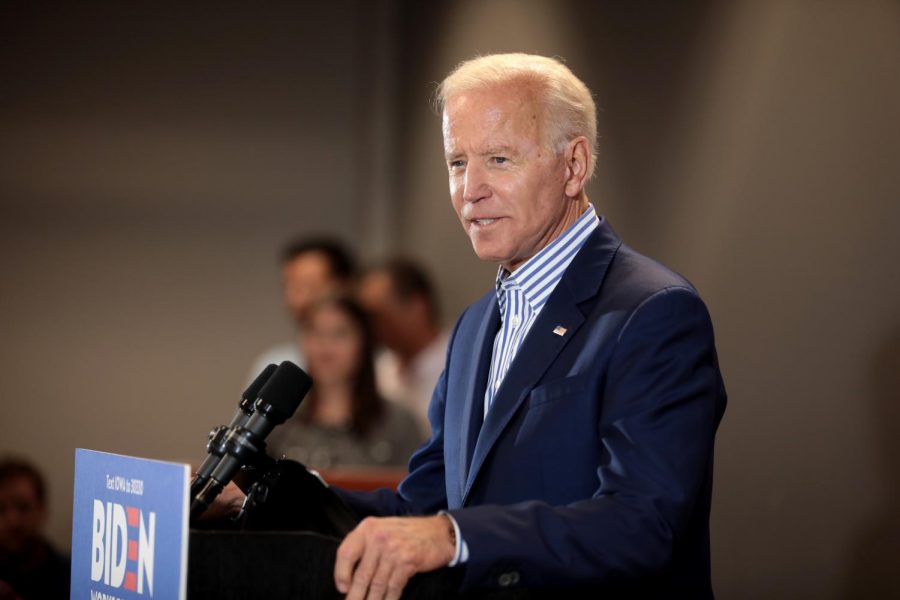President Biden Addresses Nation in Town Hall After First 4 Weeks in Office
President Joe Biden speaking at a town hall hosted by the Iowa Asian and Latino Coalition at Plumbers and Steamfitters Local 33 in Des Moines, Iowa in 2019.
Feb 24, 2021
In an hour-long town hall hosted by CNN and moderated by anchor Anderson Cooper, President Joe Biden addressed the nation by taking questions on the COVID-19 pandemic, covering issues with vaccine rollout and school reopening plans, and larger domestic and international affairs such as policing in America, improving international relations with China, student loan debt, and other issues.
The first portion of the town hall was focused on the pandemic and when Americans will be able to receive a vaccine. When asked by Cooper as to when Americans will be able to receive a vaccine for those who want it, Biden stated, “By the end of July this year. We have now, by the end of July, we’ll have over 600 million doses, enough to vaccinate every single American.” Biden later mentioned that vaccinations will be administered in the meantime.
Biden was then questioned by members of the audience. Audience member Kevin Michael asked, “Considering the hybrid and virtual school instruction have been in place for nearly a year now, what is the plan and recommendation to get students back into the brick-and-mortar buildings?”
The President gave a lengthy response to the question, highlighting how gear such as masks are needed for teachers, bus drivers, janitors, and other faculty. He then addressed the organization of students into smaller pods and a need for more teachers. In regards to transmission rates, Biden stated, “It’s much easier to send kids K through eight back because they are less likely to communicate the disease to somebody else. But because kids and sophomores, juniors and seniors in high school, they socialize a lot more and they’re older, and they transmit more than young kids do.” He later stated, “And so there’s a lot of things we can do short of, and I think that we should be vaccinating teachers. We should move them up in the hierarchy as well.” This statement garnered applause from the audience.
President Biden took more questions about vaccines, one of which coming from Dr. Dessie Levy. Levy asked, “Considering COVID 19 and its significant impact on black Americans… the exacerbation of our racial disparities in health care, we have seen less than three percent of blacks and less than five percent of Hispanics given the total number of vaccines that have been administered to this point. Is this a priority for the Biden administration? And how will the disparities be addressed?”
The President focused his response on how these communities will be given access to the vaccine. He first mentioned that he had met with the Black Caucus in the United States Congress and that community health centers “are going to get a million doses, you know, a week.” He later added that he is providing mobile units to go into neighborhoods where a pharmacy is not within walking distance, stating, “Let’s say, the fact is if you’re 70 years old, you don’t have a vehicle, and you live in a tough neighborhood, meaning, you’re — it’s a high concentration of COVID, you’re not likely to be able to walk five miles to go get a vaccine.”
Biden also announced that 1 billion dollars would be allocated to public education to help Americans find out where they can receive a COVID-19 vaccine.
The next wave of questions focused on the attack that took place on the United States Capitol building on January 6th. Audience member Joel Berkowitz asked, “Mr. President, I was shaken by the attack on the Capitol on January 6th…What can your administration do to address this complex and wide-ranging problem?”
Biden addressed actions he will be taking, stating, “And so I would make sure that my Justice Department and the civil rights division is focused heavily on those very folks, and I would make sure that we, in fact, focus on how to deal with the rise of white supremacy.”
Cooper soon after asked Biden about immigration in the United States, asking if he wants a pathway to citizenship for 11 million undocumented individuals. The President responded with “Yes.” He later mentioned, “There is a reasonable path to citizenship. And it shows up.”
The final line of questioning soon moved to international relations and the domestic issue of student loan debt forgiveness. Audience member Joycelyn Fish asked about the student loan debt crisis, stating, “We need student loan forgiveness beyond the potential $10,000 your administration has proposed. We need at least a $50,000 minimum. What will you do to make that happen?”
The plan to cancel $50,000 of student loan debt was a proposal supported by Democratic members of Congress such as Senate Majority Leader Chuck Schumer and Senator Elizabeth Warren. Biden stated, “I’m prepared to write off the $10,000 debt, but not $50,000.” This is the amount he stated in his 2020 presidential campaign. He plans on providing more money to schools such as HBCUs, stating, “They [universities] need is more money invested in making — so, that’s why I provide, for example, $80 billion — $70 billion over 10 years for HBCUs and other minority-serving universities.”




